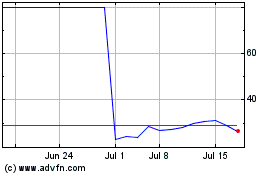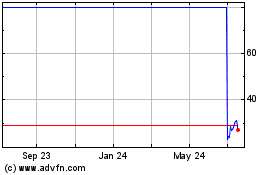By Sarah Nassauer
This article is being republished as part of our daily
reproduction of WSJ.com articles that also appeared in the U.S.
print edition of The Wall Street Journal (January 11, 2019).
Macy's Inc. and other mall-based retailers said sales petered
out at the end of the year as they continued to lose customers to
discounters and e-commerce, highlighting how not all chains are
positioned to benefit from a strong U.S. economy.
The year-end results -- and a weak profit outlook from Macy's --
clouded what have been upbeat expectations for the holiday sales
season with consumers showing a hearty willingness to spend.
The news Thursday spooked investors, who sent shares of Macy's
down nearly 18%, the department store's worst one-day decline on
record. Rival Kohl's Corp. and mall stalwart L Brands Inc., the
owner of Victoria's Secret, also posted tepid holiday sales,
triggering a broader selloff in retail stocks.
"The holiday season began strong -- particularly during Black
Friday and the following Cyber Week, but weakened in the
mid-December period," Macy's Chief Executive Jeff Gennette
said.
The negative sentiment weighed on shares of discounters like
Target Corp. and Costco Wholesale Corp. -- and yet they have posted
strong holiday sales. Those chains, which are less dependent on
apparel, and Amazon.com Inc. have been taking market share from
department stores. Target cited strong demand for toys and baby
products along with seasonal gifts.
"The rising tide of retail sales hasn't floated all boats," said
Neil Saunders, managing director of research firm GlobalData. "We
are seeing a polarization between winners and losers."
Macy's said total comparable sales rose 1.1% during November and
December. The chain lowered its sales and profit forecasts for the
fiscal full year, which ends in February.
The retailer has been investing in a group of stores it calls
magnets, adding new lighting, fixtures, a better assortment of
merchandise and technology, while trying to shrink less-promising
locations. But the changes weren't enough to accelerate growth
through what was expected to be one of the most successful holiday
seasons in years.
"It's almost as if Macy's is two companies," Mr. Saunders said,
noting that the magnet stores have been doing well while the rest
of the chain has struggled. "The other stores are dispiriting and
crammed with stock, " he said. "That is the issue that Macy's has
got to get to grips with."
Kohl's comparable sales rose 1.2% in November and December, but
its growth was slower than in the year-earlier period. The company
also said it would close two stores and offer a voluntary
retirement program for workers over 55. The company sells
merchandise similar to Macy's, though its stores typically aren't
located in enclosed malls.
"The traditional department stores' days are numbered unless
they change radically," said Craig Johnson, president of Customer
Growth Partners, a retail research and consulting firm. Many
department stores are tied to a format established in the
mid-1800s, but consumers now want value, entertainment or services
when heading to stores, he said. "If you can't succeed in an
environment like this, a strong economy, it's a problem."
Target's sales, including in-store and online, rose 5.7% between
Nov. 4 and Jan. 5. The result compares with 3.4% growth in the
year-earlier period and puts Target on track for its biggest annual
sales gain in 13 years, the company said Thursday. Costco reported
late Wednesday that its sales climbed 7%, excluding gasoline and
currency fluctuations, in the five weeks ended Jan. 6. Both
retailers said strong store traffic drove growth over the
holidays.
Target and Costco, as well as larger rival Walmart Inc., have
reported strong sales in recent quarters as they have benefited
from low unemployment and U.S. wage gains.
Their success suggests that those retailers that worked to
attract more shoppers online or invested in store operations were
able harness robust consumer spending over the holidays, even as a
stock-market swoon and a government shutdown led some investors to
worry about an economic slowdown.
Like Walmart, Target has shifted its focus toward growing
online, offering more options to receive web orders at home or pick
up those orders in stores. Target's online sales grew 29% over the
holidays. Costco has worked to keep prices for its bulk goods low
and expanded its online product selection.
Bed Bath & Beyond also reported encouraging results, saying
late Wednesday that it was ahead of schedule on improving profit
margins. Same-store sales at the home-goods retailer continued to
decline, but its shares defied the sector downturn Thursday, rising
more than 16%.
Some retailers have continued to struggle as shopping shifts
online. Traffic to physical stores fell 3% between Nov. 18 and Dec.
29, according to ShopperTrak, which uses cameras to track shoppers
in stores.
On Tuesday, department-store operator J.C. Penney Co. said
comparable sales fell 3.5% in the nine weeks ended Jan. 5 and that
it planned to close more stores this year after a stretch of weak
sales figures. L Brands said comparable sales for its Victoria's
Secret brand declined during the holiday season and margins
suffered, sending its shares down 4.5%.
Target on Thursday said Cathy Smith, who joined the retailer as
chief financial officer in 2015, will retire. The company has hired
a search firm to find a successor and said is considering internal
and external candidates. Ms. Smith plans to stay in her role until
a successor is named and act as an adviser until May 2020.
The company left its financial guidance unchanged, with
comparable sales growth for the current quarter expected to
register at about 5% and full-year earnings pegged at $5.30 to
$5.50 a share.
--Micah Maidenberg, Kimberly Chin and Suzanne Kapner contributed
to this article.
Write to Sarah Nassauer at sarah.nassauer@wsj.com
(END) Dow Jones Newswires
January 11, 2019 02:47 ET (07:47 GMT)
Copyright (c) 2019 Dow Jones & Company, Inc.
LandBridge (NYSE:LB)
Historical Stock Chart
From Jun 2024 to Jul 2024

LandBridge (NYSE:LB)
Historical Stock Chart
From Jul 2023 to Jul 2024
